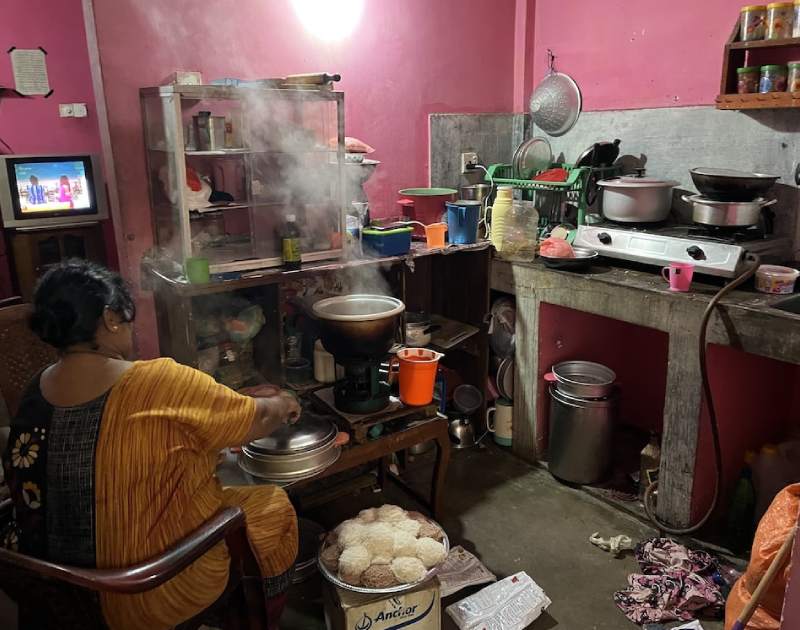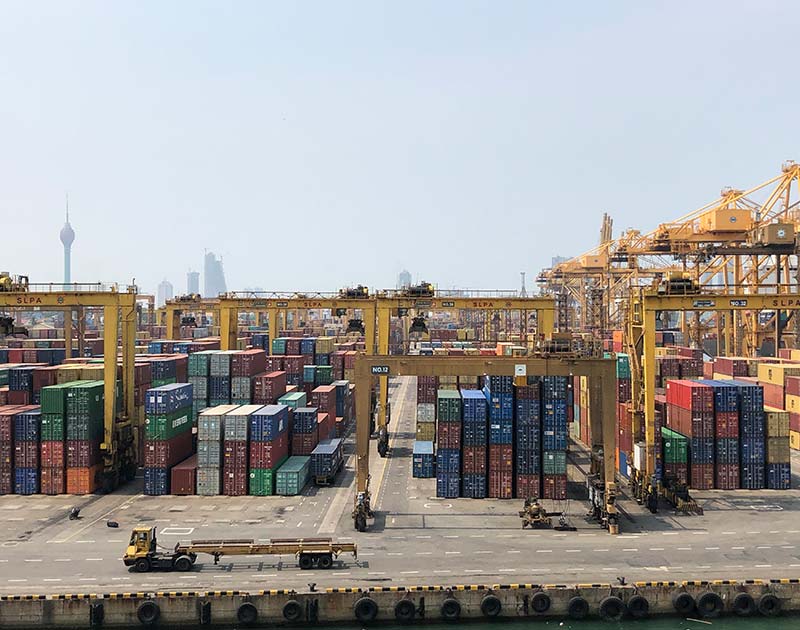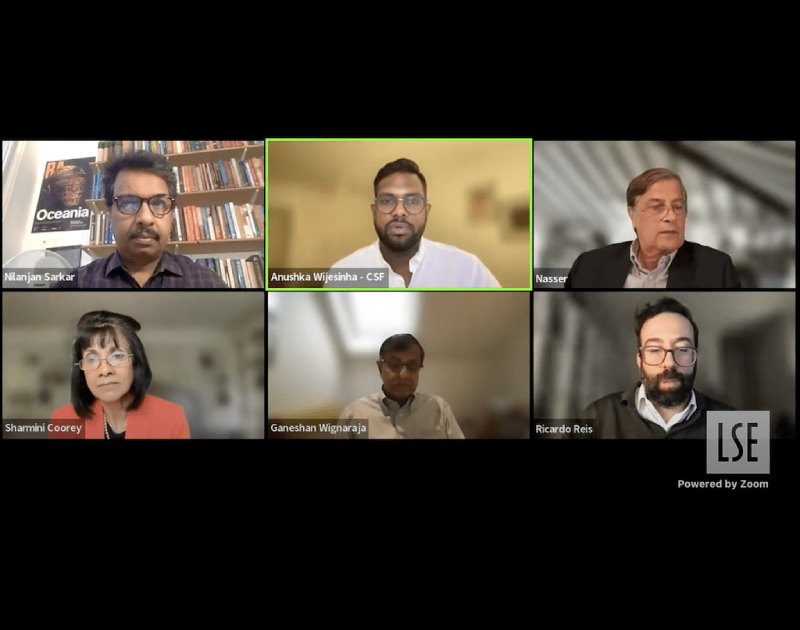
- Home
- Knowledge Insights
- Breaking Point: Impact of Sri Lanka’s Economic Crisis on Colombo’s Working Class Poor
The following is an excerpt from our April 2023 Policy Brief. Please click here for the full document..
The impact of the economic crisis on the working class poor of Colombo over the past year cannot be overstated. As we highlighted in our May 2022 policy brief, . most of these households that were already affected by the pandemic due to a loss of daily wage work following the imposition of COVID-19 lockdowns, were cash-strapped and struggling to make ends meet when the economic crisis hit last year. The April 2023 policy brief gives an update on the current status of working class poor households and those working in the informal sector in Colombo. This includes the impact of the electricity tariff hikes on them, a commentary on the ongoing Welfare Benefits Board enumeration of households, and recommendations on how the State and policy makers can support these families in crisis.
As of February 2023, CCPI based headline inflation was 50.6%, while food inflation (Y-o-Y) was at 54.4% in the same month. Sri Lanka’s nominal food inflation is the seventh highest in the world, as of January 2023. In September 2022, Sri Lanka recorded its highest food inflation at 94.5%. A recent survey by Save the Children Foundation. found that half of Sri Lanka’s families are reducing their children’s food intake with 36% of the households surveyed indicating that they were unable to provide any or adequate nutritious food for their children. In December 2022, 33% of all households were deemed food insecure, while 68% of households were seen to be using food coping strategies to deal with the rising food prices. Low income households were also affected by the hike in bus fares, which was increased by 22% in June 2022. An April 2023 update by the World Bank.
states that poverty doubled from 2021 to 2022, pushing an additional 2.5 million people below the poverty line, and that urban poverty rates have tripled from 5% – 15%.
During the past two and a half years, while conducting fieldwork and engaging with the working class poor communities in Colombo, our research has documented a gradual deterioration in the quality of life and coping mechanisms in their households. In the second half of 2021 when the milk powder and gas cylinder shortage began to set in, households were still attempting to recover from the loss of income and accumulated arrears and debt from the 2020 – 2021 lockdown period. During this period, households were beginning to comment on the increase in the price of food and adding other types of cooking energy sources to replace gas. However, they were still able to put three meals on the table and it was a diverse food plate with proteins such as fish and eggs, fresh vegetables and leafy greens as well as fruit. By mid 2022, families had already started cutting back on nutritious meals with some cutting back on the number of meals altogether.
Today, many families are barely eating. What they eat is not necessarily nutritious either – food that fills them up easily, cooks fast and is cheap are the main considerations. Expenses are competing in an unprecedented way, and what (and sometimes whether) you eat determines if you have money to go to work or school the next day or if instead that money can go towards avoiding disconnection of water or electricity or the loss of a gold chain that has been pawned. We’ve also been told of situations where families share the thriposha supplement given to young children as a means of meeting the entire family’s nutrition requirements. It is not just nutrition that is unaffordable – families interviewed tell us that many medicines they require monthly for non-communicable-diseases and even heart medication are not always available at the government clinics, forcing them to purchase them from private pharmacies.
In 2022, children who experienced significant learning loss from 2020 – 2021 were back at home as parents could not afford to send them to school or schools were closed altogether. Tuition classes used to be a way for parents to ensure children were coping with the learning loss that happened during COVID lockdowns, but by the second half of 2022 when food inflation was over 90% and electricity tariff hikes were imposed, tuition and extra curricular activities became unaffordable. Today we see that children are not sent to school regularly because families cannot afford the transport or additional costs like school shoes, school bags, books etc. Food is also linked to school attendance – parents say that if their child’s school provides a mid day meal, they make sure their child goes to school. However, many families tell us that their children’s school does not have a meal programme and as they are required to send a nutritious meal for their child, there are days where they just cannot send their child to school as there is no food at home. Some days when they do have food at home, they do not have money for the transport to school.
While there are no more long queues in the city for gas cylinders or kerosene, the reality is that availability does not mean affordability. Today, stacks of firewood have become a common sight at low-income settlements around Colombo. In 2020 during our fieldwork in North Colombo, families pointed out that they had shifted away from firewood as a cooking source to gas over time, and that sourcing firewood was almost impossible as there was no demand. During the gas shortage last year, many families relied on cooking on electric stoves or rice cookers, but electricity price hikes from August 2022 onwards have made it costly for those households to rely on them for preparing their everyday meals. In many households, stacking is used as a means of avoiding price shocks for fuel sources like gas, which still remains unaffordable for low-income households in Colombo. While the use of wood-fire stoves and coal stoves is also prevalent among the urban poor, spatial limitations and health considerations make them less-preferred sources of cooking.
People have also run out of coping strategies. Many people we interview make the same point over and over again – what more can they sell or pawn to make ends meet? What more can they possibly give up to cut down their expenses? Totals of accumulated bills, loans and debt are in the six figures – this is money they will never be able to earn or pay back. While the prices are gradually coming down right now, the financial situation of the working class poor communities are so dire that even if everyday costs go back to pre-2020 prices, life will still not go back to normal any time soon. The case studies in this policy brief show how interconnected all the issues are and why we cannot isolate food inflation from electricity tariff hikes or fuel prices from quality of life or social security.
Much of the crisis specific responses, reporting and policies have focussed on food security and nutrition, health and medicine, or fuel and fertiliser in isolation. We reiterate that there needs to be a more holistic approach to assessing and understanding the impact, particularly on working class poor and lower middle class families. While a year ago the crisis was primarily around putting food on the table and energy, today the issues are varied and yet interconnected. Therefore any support or policy making must consider all of this, and also prioritise not just short term recovery (like putting food on the table) but also address how these communities will recover in the long term from the debt, asset loss, livelihood impact and learning loss.
In this context, social security becomes a very important consideration for low-income settlements and the informal sector in Colombo. Discourse and policy surrounding social security must take into account the lived realities of the working class poor, and ensure that it actually offers tangible support that will better their quality of life. If not, the impact of this crisis will be generational and people will have lost the decades of investment and hard work they have put in towards creating a better and comfortable life for themselves. The end goal of Sri Lanka’s recovery process must not be to recover to a point where people can make ends meet, but one where the recovery is just and equitable, and people experience a better quality of life within this lifetime.
Below are a list of immediate term recommendations that have been formulated together with community members as well as studying relief measures elsewhere. Many of these recommendations we have made last year as well, and unfortunately have not seen a meaningful effort beyond increasing efficiency of cash transfer mechanisms to be implemented and increase in school midday meal programmes around the country. One intervention alone will not adequately support urban households and these recommendations are proposed based on the assumption of a variety of interventions being implemented simultaneously. We also recommend that these measures are universal to every household below a particular income or need threshold and not targeted as that would only exacerbate existing divisions in communities and favour some over others based on political affiliations, ethnicity etc. Furthermore communities are beyond the point of targeted measures and a realistic understanding of the household budget must be reached before determining the threshold. This understanding will only be reached with meaningful and robust consultations at a community level, and with the active participation of women.
Address nutrition, not hunger. Calculating food expenditure must show an appreciation for dietary diversity, cultural practices of cooking, as well the varied nutritional needs and demands of households. Households must be guaranteed a certain amount of rice, pulses, vegetables, fruit, milk, eggs every week for at least one year and this would enable them to meet nutrition requirements irrespective of inflation, as well as freeing up income that can be put towards other expenses.
Nutrition levels in children can also be targeted through meal programmes at every school irrespective of whether they previously had a school mid-day meal programme or not. While this would ease the burden on the families who have to send food for their children everyday to school, it would also provide daily access to nutrition the children may otherwise not receive. The current allocation of per school meal should be revised in order to ensure that this meal can account for dietary diversity and cost.
Source and distribute locally. For recommendation #1, households state that they would prefer to receive these weekly goods through their local community vendors and shops so as to give them business, as well as not having to queue up at supermarkets and other outlets every week. This will also ensure that families do not have to travel far to access these goods. Linking these weekly basket of goods to local, smaller scale grocery shops will also help local businesses to stay afloat, whilst also driving community development. For school meal programmes, this method should also be adopted where fruit and vegetable and other ingredients should be sourced as locally as possible, providing income to local farmers and shops, and reducing food miles.
Promote sustainable urban gardening. Given the built environment in urban settlements in Colombo, home gardening is not a viable option for most communities due to lack of space. However there are innovative ways in which households with small spaces can grow certain type of nutritious food in a small space – such as spinach, tomato, chillies – if such methods and tools can be made accessible to them. Wherever space is available could be used as community allotments as well, but would require a methodical and sustainable engagement with the communities to do so. Methods such as this cannot meet total nutritional requirements of families but can help to supplement nutrition, and also improve diversity of diet.
Adjust the food plate. At a time where the concept of a nutritious diet seems almost impossible when people are struggling to even eat a meal a day, targeted information and communication campaigns can better help households to identify meals that are low in cost, high in nutrition and how they can be sourced locally. This could also support households to identify food rich in nutrition and mitigate long-term health impacts. Campaigns such as this should run on a range of communication channels (TV, Radio, Social Media, physical posters etc) in order to reach a wide demographic.
Provide monthly cash transfers. Households have needs beyond food expenditure which require cash in hand. These range from rent to utility bills to transport to medicine to children’s education to loans/mortgages to everyday items like soap and clothes. We recommend a minimum of LKR 25,000 per household per month in the form of cash transfers for these non-food expenditures.
Cancel or restructure defaults on utility bills. Many urban working class poor communities are struggling to pay utility bills and other debt that have accumulated since the first COVID-19 lockdown in March 2020. These arrears are of such high rates for some families that they will never be able to pay off that debt to the utility companies and the Urban Development Authority. This places an extraordinary burden on households already struggling to make ends meet, not to mention the effect on people’s mental health. We recommend analysing the various debt to the State across the various settlements in Colombo and moving towards cancelling the arrears or findings other ways of making those payments – for example a long term repayment plan for amounts accumulated so far.
Do not increase the burden on women. Over the last two years we have seen women shoulder the additional burdens of the crisis, whether it be finding ways to put food on the table through time consuming cooking methods, shifting to washing clothes by hand or handwriting children’s homework sheets when they cannot afford print outs. Recovery efforts such as school meal programmes, community gardens and community kitchens rely heavily on the unpaid labour of mothers and women of the community. If such labour is required, those programmes must build in budgets to pay for the time put in by the women instead of making it a requirement for the functioning of the programme. The programmes could also be envisioned as livelihood opportunities for the women and men of that community instead of demanding their unpaid time towards it.
Provide free public transport for school children. With the increase in fuel prices and the effect it has on modes of transportation such as three-wheels and private school van costs, many families have switched to public transport over the past year. However with the increase in bus fares even this cost is not one that is borne easily and there are those who do not have enough bus fare on some days to send their children to school. We recommend free public transportation for school going children or dedicated school transportation that is free of charge in order to ensure children go to school regularly.
Prioritise a Just Recovery. While support for communities to recover from the impact of the crisis in the immediate future is necessary, the Government must also plan and budget for addressing the long term recovery. These include more budgetary allocations to the health, education and social welfare sectors, supporting livelihoods (formal and informal) of communities and connecting them with access to finance, markets, new skills and vocations so that they are able to come back to a stable position where they are able to meet their needs without being dependent on State or private support. This also extends to addressing the high rate of unemployment – both from lack of qualifications/skills and lack of jobs – among urban youth.
Pleaseclick here for the full Policy Brief..
This policy brief includes information and analysis from Colombo Urban Lab’s ongoing (2020-2024) research and community engagement funded by two United Kingdom Research and Innovation projects. For more information please contact [email protected]


